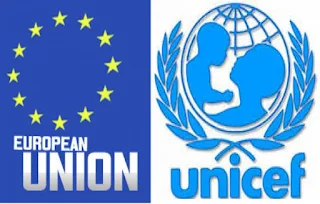Chioma Umeha
The United Nations Children’s Fund (UNICEF) on
Monday, said that poor access to portable water, improved sanitation and
hygiene (WASH) have a link to increase in diarrheal diseases which has been
known from research to affect a child’s nutritional status.
Ms Mainga Banda, a UNICEF Water Sanitation and
Hygiene (WASH) Specialist, who spoke at the opening of a Media Dialogue on WASH
in Awka, Anambra stressed that improving access to WASH reduces diarrhea
diseases.
Research shows that about 45 million under-five
global children die annually from diseases caused by poor access to water,
sanitation and hygiene.
At the event which was organised by the Child
Rights Information Bureau (CRIB) of the Federal Ministry of Information in
collaboration with UNICEF with support from European Union (EU), she
corroborated research which shows that frequent diarrhea causes undernutrition.
According to statistics from a study titled,
“Multi-country analysis of the effects of diarrhea on childhood stunting,’
“Diarrhea diseases can also affect a child’s nutritional status.
“25 per cent of stunting in children under the age
of two could be due to five or more diarrhea episodes,” the study added.
It explained, “Repeated bouts of diarrhea causes
undernutrition which in turn reduces a child’s resistance to subsequent
infections, creating a vicious circle.”
It added that diarrhea causes death by depleting
body fluids resulting on childhood growth and cognitive development of a child.
Similarly, it said that sanitation in Nigeria is
declining and called for concern even though the country is investing more on
sanitation.
Banda also noted, WASH has a critical role to play
in the not only in reduction of diarrhea disease but, in prevention of
Neglected Tropical Diseases (NTD) which is silent killer of childrern as well
as diarrhea.
Bemoaning the impact of poor WASH on children’s
health and development, she stressed that the problem is a multi-sectoral one
which requires multi-sectoral approach to tackle it.
Earlier, Mr. Olumide Osanyinpeju, Deputy Director,
Child Right Information Bureau of the Federal Ministry of Information and
Culture commended UNICEF and EU for their continuous as well as huge support in
ensuring that safe water, sanitation and hygiene are brought to the rural
people of Nigeria through the WASH Programme is highly commendable.
According to him, the issue of safe water and
sanitation has been in the front burner of development issues in Nigeria
because it affects a major segment of our society, a lot of who are children.
Osanyinpeju said, “Water, Sanitation and Hygiene
is very important in the life of a Child.
“The Sustainable Development Goal (SDG) six
clearly emphasises the importance of clean water and sanitation. Water and
Sanitation are essential for the survival and development of all children,
while simple hygiene such as hand washing can save lives.
Earlier, Mr Geoffrey Njoku, UNICEF Communication
Specialist, identified objectives of dialogue to include creation of visibility
for WASH interventions, donors and to generate human interest stories for
publication.
Njoku said that it was an opportunity for
journalists to develop human angle stories that would encourage Nigerian
government to increase investments in WASH interventions.




